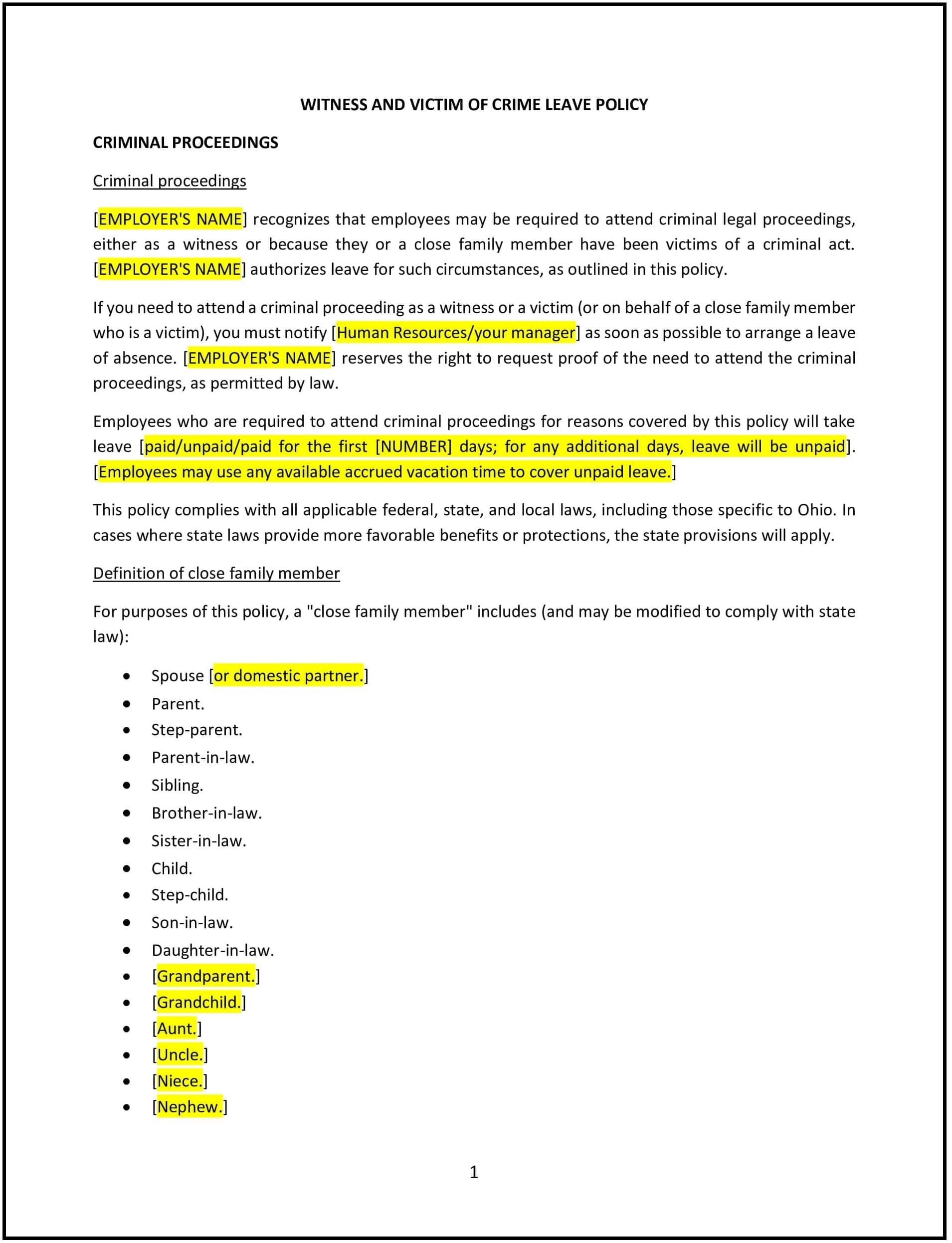Witness and victim of crime leave policy (Ohio): Free template
Got contracts to review? While you're here for policies, let Cobrief make contract review effortless—start your free review now.

Customize this template for free
Witness and victim of crime leave policy (Ohio)
A witness and victim of crime leave policy outlines the rights and procedures for Ohio employees who are witnesses to or victims of a crime, allowing them to take leave for attending court hearings or dealing with the aftermath of the crime. This policy provides clear guidelines for requesting leave, the duration of leave allowed, and how it applies to different types of crimes, including violent crimes, property crimes, or those involving fraud. It ensures that employees can fulfill their legal obligations or recover from crime-related trauma without fear of losing their job or income.
By implementing this policy, Ohio businesses can support employees who are victims or witnesses of crimes, ensuring that they have the time and flexibility needed to navigate legal proceedings while maintaining a supportive and compassionate workplace environment.
How to use this witness and victim of crime leave policy (Ohio)
- Define eligibility criteria: The policy should specify which employees are eligible for crime leave, such as full-time or part-time employees, and whether there are any requirements for the length of employment or whether the employee is a direct victim or merely a witness to the crime.
- Clarify the types of leave covered: The policy should clearly specify which situations qualify for leave, such as attending court proceedings, meeting with law enforcement, or dealing with the aftermath of a violent crime. It should also outline whether this leave is paid or unpaid and any documentation required, such as court summons or police reports.
- Specify duration and limits of leave: The policy should set clear limits on how much leave employees are entitled to take, whether it's based on the number of days for court attendance or a set period for dealing with the consequences of being a victim of a crime. The policy should specify whether employees can take intermittent leave or if it must be taken in one continuous block.
- Set procedures for requesting leave: Employees should be required to notify the business in advance when requesting leave, unless the situation is urgent. The policy should specify how employees should request leave (e.g., written notice, email, or formal application) and the amount of notice required.
- Address confidentiality: The policy should include provisions for maintaining employee confidentiality when they are victims or witnesses of a crime, ensuring that their privacy is respected throughout the process of requesting and taking leave.
- Outline compensation: The policy should specify whether the leave will be paid or unpaid. If paid leave is not provided, the policy should clarify whether employees can use accrued vacation or personal leave to cover the time they need off.
- Define responsibilities: The policy should outline the employee's responsibility to keep the business informed about their leave status, including any changes to their expected return date or the need for additional leave.
- Review and update regularly: The policy should be reviewed periodically to ensure it aligns with Ohio state laws, federal regulations, and the evolving needs of the business.
Benefits of using this witness and victim of crime leave policy (Ohio)
This policy provides several key benefits for Ohio businesses:
- Supports employee well-being: By providing time off for employees who are witnesses to or victims of crimes, the policy helps employees manage the emotional, physical, and legal impacts of crime, supporting their recovery and well-being.
- Fosters a compassionate workplace: The policy demonstrates the business’s commitment to supporting employees during difficult personal circumstances, helping to build loyalty, trust, and morale within the workforce.
- Mitigates legal risks: Offering this leave helps businesses comply with Ohio state laws regarding employee rights in crime-related situations, reducing the risk of legal challenges or claims for wrongful termination.
- Promotes employee retention: By offering crime-related leave, businesses show that they value their employees and are willing to support them through challenging life events, which can improve employee retention.
- Enhances employee productivity: Allowing employees to take time off when they need it to deal with crime-related matters helps them return to work focused and productive, minimizing distractions that could arise from unresolved personal issues.
- Strengthens company reputation: Offering leave for crime victims and witnesses enhances the business's reputation as a responsible and caring employer, attracting talent and reinforcing positive relationships with employees.
Tips for using this witness and victim of crime leave policy (Ohio)
- Communicate the policy clearly: Ensure that all employees are aware of the witness and victim of crime leave policy by including it in the employee handbook, reviewing it during onboarding, and providing periodic reminders about how to apply for the leave.
- Make leave requests straightforward: Employees should be able to request leave easily, whether through an online system or by notifying HR or management directly. The policy should emphasize that employees are not required to disclose the details of the crime, just the need for time off.
- Ensure sensitivity and confidentiality: Since the policy may involve sensitive situations, ensure that all communications and documentation regarding crime leave are handled with confidentiality and respect for the employee's privacy.
- Keep track of leave usage: Keep records of crime leave taken by employees, including the duration and dates of leave. This helps ensure that the policy is applied fairly and allows for better planning and coverage during the employee’s absence.
- Provide support resources: In addition to granting leave, businesses should consider providing additional resources, such as counseling services, to employees affected by crime. This reinforces the business’s commitment to employee well-being.
- Review the policy periodically: Regularly review the policy to ensure it remains up-to-date with Ohio state laws, federal regulations, and any changes to workplace practices related to employee rights and leave.